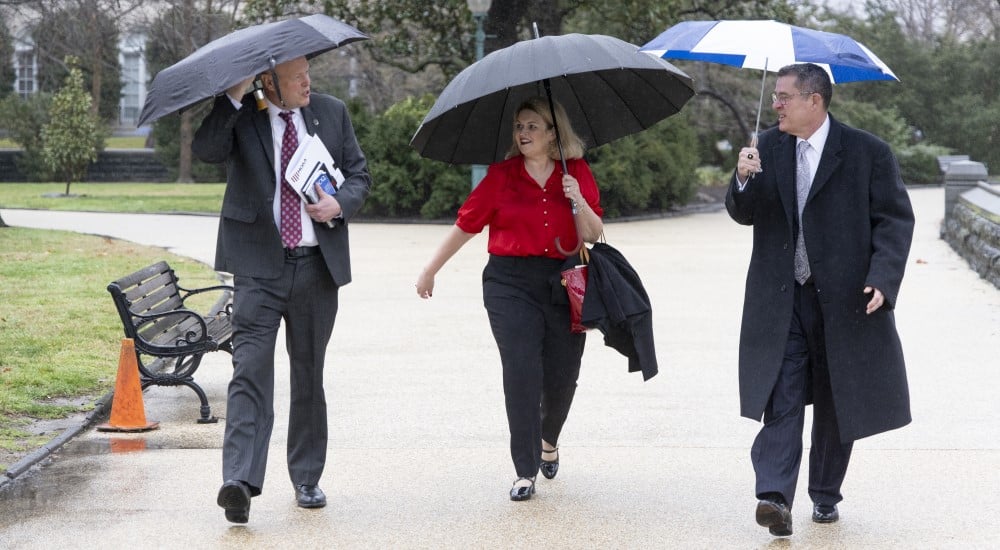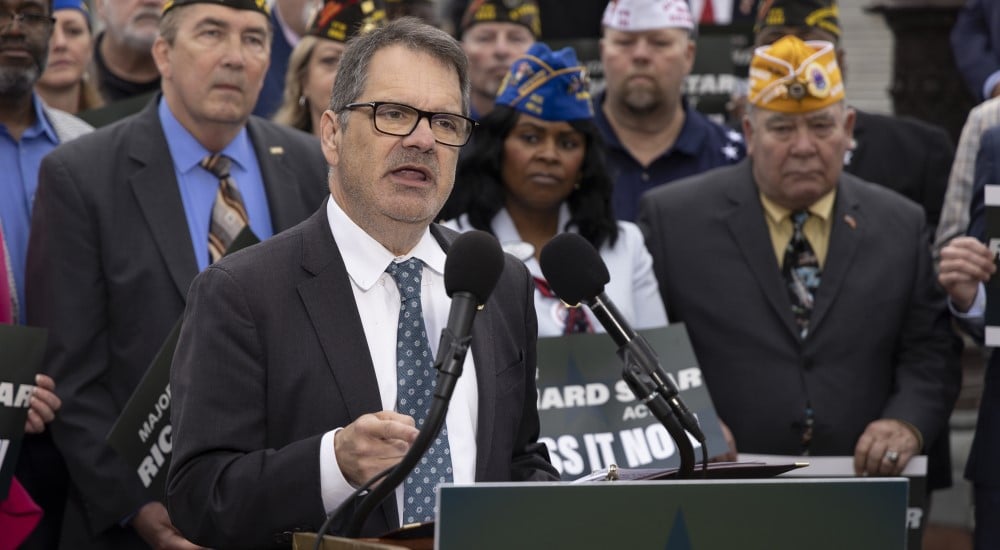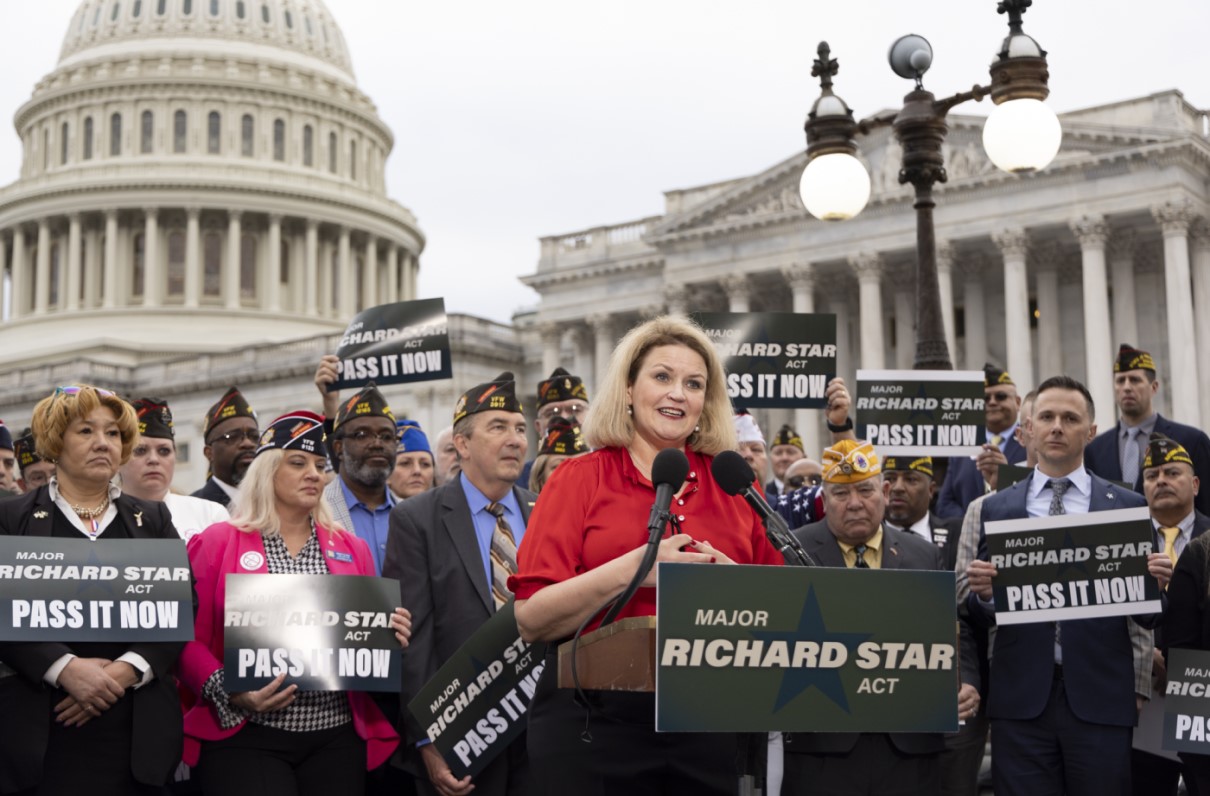Sgt. James Powers, USA (Ret), traveled from Canton, Ohio, this week to meet with his lawmakers on Capitol Hill and voice his support for the Major Richard Star Act.
Powers, an Iraq War vet who sustained numerous injuries downrange, is one of more than 52,000 combat-injured veterans forced to retire early and may have his DoD retirement pay, calculated for years of service, docked because he was injured in combat. The Major Richard Star Act would qualify combat-injured veterans for the existing Defense Finance and Accounting Service (DFAS) open season that would authorize concurrent receipt of earned DoD retirement pay and VA disability compensation.
[TAKE ACTION: Ask Your Lawmakers to include the Major Richard Star Act in the FY 2025 NDAA]
“The only way our elected officials know the needs of the American people – and most importantly veterans – is when we show up and we explain it to them,” said Powers, who joined dozens of veterans and advocates participating in The Military Coalition’s Star Act Hill Day on March 5.
MOAA, a member of The Military Coalition, led planning efforts for the event; members of MOAA’s government relations team met with Senate leadership during the Hill Day and expressed the need to include the legislation in the FY 2025 National Defense Authorization Act (NDAA).
The bill is named after Maj. Richard Star, USAR, a combat engineer who served in Afghanistan and Iraq, and who lobbied for the bill even while fighting the late stages of cancer. He died in 2021.

From left, Lt. Col. Mark Belinsky, USA (Ret), MOAA's director of Government Relations for Currently Serving and Retired Affairs, Tonya Star, and CWO4 Jack Du Teil, USA, (Ret), president of The Military Coalition, take part in Star Act Hill Day events March 5 in Washington, D.C.
If approved, the legislation would allow combat-injured veterans to receive both their DoD retirement pay and VA disability compensation without offset. The bill has garnered widespread support in both the Senate (71 co-sponsors) and the House (327 co-sponsors), but cost remains a concern for some lawmakers.
“Passing this bill is a cost of war,” said Sen. Jon Tester (D-Mont.), chairman of the Senate Veterans’ Affairs Committee, during a March 5 press conference in front of the Capitol steps. “If we’re not willing to take care of the folks we send off to battle when they get back home, then we shouldn’t send them off to battle to begin with.”
[RELATED: Combat-Injured Veterans Need Our Help NOW – Here’s How to Join the Fight]
Tester, the Senate bill’s original sponsor, was flanked by a sea of veterans, many holding “PASS IT NOW” signs. The military and veteran service organization community is united in this message as well: The Military Coalition represents nearly 5.5 million veterans across 35 organizations, including members of MOAA and the VFW, and the Star Act has gained additional supporters, including Disabled American Veterans and the American Legion.
“Today we were able to bring together a coalition of an enormous amount of support,” said Lt. Col. Mark Belinsky, USA (Ret), MOAA’s director of government relations for currently serving and retired affairs. Belinsky led a similar Hill Day last year, helping to grow co-sponsors. This year, he spoke directly with Senate leadership, joined by Richard Star’s widow, Tonya Star.
“I think it made a huge impact to have Tonya Star personally there to discuss the impact on families,” Belinsky said.
Tonya Star spoke at the press conference, rallying advocates to keep fighting.
“We are closer than we have ever been,” she said. “We’re going to get it done this year!”
[RELATED FROM 2020: A Wife's Request: Please Support the Major Richard Star Act]

Rep. Gus Bilirakis (R-Fla.), original sponsor of the House version of the Major Richard Star Act, takes part in a March 5 press conference on Capitol Hill.
Sen. Mike Crapo (R-Idaho), who introduced the bill alongside Tester, praised Tonya Star’s courage in carrying on her husband’s legacy. He also emphasized his commitment to keep up pressure on the Hill.
“The injustice is so obvious that every American who hears about it knows it’s something we need to do,” Crapo said. “It’s time to get the bill done.”
Army Staff Sgt. Alexander Mikhailovsky is transitioning out of uniform at the end of this month. The logistician deployed to Afghanistan in 2019 as part of the 398th Combat Sustainment Support Battalion, attached to the 1st Infantry Division. He survived base attacks and conducted more than a dozen dignified transfers of U.S. service members killed in action, some from green-on-blue attacks. Mikhailovsky returned home with post-traumatic stress and was ordered to medically retire, cutting his service short after 11 years.
He heard about the Hill Day and showed up wanting to bring a voice for not only himself but his friends and fellow wounded warriors whose service is also ending prematurely.
[MORE COVERAGE: Military Times | Military.com]
He encourages everyone reading this message to join our cause.
“Get with your battle buddies, whether you’re an NCO or an officer,” he said. “Get with the guys who are affected by this bill and know that your voice matters. You can simply write to a congressman – there are templates online. Pick up a phone and call. The staff there are very easy to communicate with. It’s those little things that count and it’s going to make a difference. It matters.”
Spring Advocacy Push
Ready to follow Mikhailovsky’s lead? MOAA relies on grassroots advocacy from our members and others as we prepare for our annual Advocacy in Action campaign, which includes the Major Richard Star Act.
Getting beyond the “support the troops” sentiment is critical to building support with your lawmakers. Check the Star Act co-sponsor lists (Senate | House) to see whether they are on board; if so, take the time to thank them and ask them to influence their chamber’s leadership to get the bill into the NDAA this year.
The ask: Please ensure the Major Richard Star Act is part of your official FY 2025 NDAA request and included in the base text of the defense bill.
[MOAA'S ADVOCACY UPDATE: Combat-injured Vets Unfairly Penalized]
Outside of in-person engagement, you can:
- Register for our Legislative Action Center and recruit your network of friends and family to do the same – MOAA membership is not required.
- Encourage members of your network to contact their representatives at 866-272-MOAA (6622), MOAA’s toll-free line to the U.S. Capitol switchboard. Ask to speak with the military legislative assistant (MLA) in the office; if that staffer is not available, consider scheduling a follow-up call to make a personal connection with legislative staff.
Follow the progress of all MOAA’s legislative initiatives at MOAA’s Advocacy News page.
When MOAA Speaks, Congress Listens
Learn more about MOAA’s key advocacy issues, and contact your elected officials using our messaging platform.

